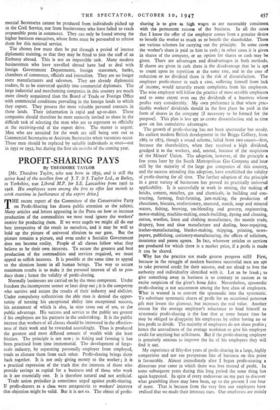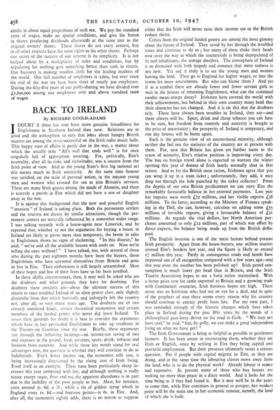PROFIT-SHARING PAYS
By THEODORE TAYLOR
[Mr. Theodore Taylor, who was born in 1850, and is still the active head of the woollen firm of 7. T. & 7. Taylor Ltd., at Batley, in Yorkshire, was Liberal M.P. for S.E. Lancashire from 1906 to 1918. His employees were among the first to offer last month to work overtime in furtherance of the export drive.] THE recent report of the Committee of the Conservative Party on Profit-Sharing has drawn public attention to the subject. Many articles and letters appearing in the Press on how to increase production of the commodities we most need ignore the workers' motive for producing them. If we were angels we might all do our best irrespective of the result to ourselves, and it may be well to hold up the picture of universal altruism to our gaze. But the picture remains a picture, and even under a Socialist Government does not become reality. People of all classes follow what they believe to be their own interests. To secure the greatest and best production of the commodities and services required, we must appeal to selfish interests. It is possible at the same time to appeal to the altruism latent in all human beings. The way to secure maximum results is to make it the personal interest of all to pro- duce them; hence the validity of profit-sharing.
Normally businesses are carried on by the most competent. Under freedom the incompetent sooner or later drop out ; it is the competent who survive and secure the results of their industry and abilities. Under compulsory collectivism the able man is denied the oppor- tunity of turning his exceptional ability into exceptional success, his attainment of which is also, in nine cases out of ten, to the public advantage. His success and service to the public are greater if his employees are his partners in the undertaking. It is the public interest that workers of all classes should be interested in the effective- ness of their work and be rewarded .accordingly. Thus is produced the greatest and most diffused amount of wealth with the least friction. The principle is not new ; in fishing and farming it has been practised from time immemorial. The development of large- scale industry, by separating personally employer from employed, tends to alienate them from each other. Profit-sharing brings them
back together. It is not only giving money to the worker ; it is a practical expression of the truth that the interests of those who
provide savings as capital for a business and of those who work in it are essentially one. It is therefore natural and not artificial. Trade union prejudice is sometimes urged against profit-sharing. If profit-sharers as a class were antagonistic to workers' interests that objection might be valid. But it is not so. The object of profit-
sharing is to give as high wages as are reasonably consistent with the permanent success of the business. In all the cases that I know the offer of the employer comes from a genuine desire to benefit the worker as much as to benefit the shareholder. There are various schemes for carrying out the principle. In some cases the worker's share is paid to him in cash ; in other cases it is given in shares of the company, or an option for shares or cash may be given. There are advantages and disadvantages in both methods. If shares are given in cash there is the disadvantage that he is apt to count upon its repetition at the same rate, and in the case of reduction or no dividend there is the risk of dissatisfaction. The employer profit-sharer in such a case, suffering himself from lack of income, would naturally resent complaints from his employees. The wise employer will follow the practice of most sensible employers and to some extent even out the dividends of a business whose profits vary considerably. My own preference is that where prac- ticable workers' dividends should in the first place be paid in the form of shares in the company (if necessary to be formed for the purpose). This plan is less apt to create dissatisfaction and as time goes on has cumulative advantages.
The growth of profit-sharing has not been spectacular but steady. Its earliest modern British development in the Briggs Colliery, from 1865 to 1875, though a sound scheme, failed from two causes—first, because the shareholders, when they received a high dividend, grudged it to the workers, and, second, because of the suspicions of the Miners' Union. The adoption, however, of the principle a few years later by the South Metropolitan Gas Company and later still by the majority of the large gas companies of this country, and the success attending that adoption, have established the validity of profit-sharing for all time. The further adoption of the principle in a great variety of businesses has proved its practically universal applicability. It is successfully at work in mining, the making of bricks, cement, matches, gas and chemicals, in building and con- tracting, fanning, fruit-fanning, jam-making, the production of chocolates, biscuits, confectionery, mustard, starch, soap and mineral waters, fishing, brewing, tea-blending and grocery, engineering, motor-making, machine-making, coach-building, dyeing and cleaning, cotton, woollen, linen and clothing manufacture, the mantle trade, drapery, boot and shoe manufacture and dealing, boot-repairing, leather-manufacturing, blanket-making, shipping, printing, news- papers, publishing, stationery-manufacturing, the offices of solicitors, insurance and patent agents. In fact, wherever articles or services are produced for which there is a market price, if a profit is made it can be shared.
Why has the practice not made greater progress still? First, because in the struggle of modern business successful men are apt to take personal credit for their success, and are afraid to lose the authority and individuality identified with it. Let us be frank ; to give something away in business is so contrary to custom as to excite suspicion of the giver's bona fides. Nevertheless, spasmodic profit-sharing is not uncommon among the best class of employers.
What is wanted is to convert the spasmodic into the systematic.
To substitute systematic shares of profit for an occasional generous gift may lessen the glamour, but increases the real value. Another reason for the average employer's reluctance to bind himself to systematic profit-sharing is the fear that at some future time he may be obliged to disappoint his employees by either having no or less profit to divide. The majority of employers do not share profits ; hence the unreadiness of the average workman to give his employer credit for anything but selfishness. But if the profit-sharing employer is genuinely anxious to improve the lot of his employees they will find it out.
My experience of fifty-five years of profit-sharing in a large, highly competitive and not too prosperous line of business on this point
is favourable. Almost immediately after I began profit-sharing a disastrous year came in which there was loss instead of profit. In some subsequent years during this long period the same thing has
again happened. In spite of every endeavour on my part to discover what grumbling there may have been, up to the present I can hear of none. That is because from the very first our employees have realised that we made their interests ours. Our employees are mainly adults in about equal proportions of each sex. We pay the standard rates of wages, make no special conditions, and give the bonus in shares producing dividends afterwards at the same rate as the original owners' shares. These shares do not carry control, but in all other respects have the same rights as the other shares. Perhaps one secret of the success of our scheme is its simplicity. It is not hedged about by a multiplicity of rules and conditions, but by • stipulating for nothing gets something better than cash in return. Our business is making woollen cloth for the leading markets of the world. Our full number of employees is 1,600, but ever since the end of the war we have been short of nearly 300 employees. During the fifty-five years of our profit-sharing we have divided over £1,890,000 among our employees over and above standard rates of wages.



































 Previous page
Previous page